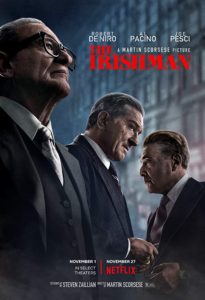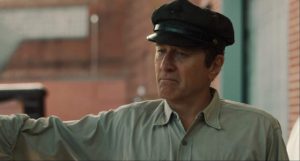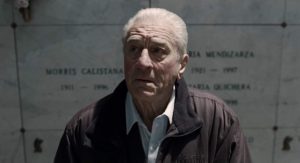 When I settled into my theater seat to watch The Irishman, I wasn’t prepared to enter Scorsese’s excellently crafted world of mobsters (and I definitely wasn’t ready for the 210-minute runtime). It was thrilling to experience the expert handling of storytelling from master storytellers—both behind and in front of the camera. It felt like a reunion of sorts to see Robert De Niro, Joe Pesci, and Harvey Keitel all working together on a project with Martin Scorsese—their long-time collaborator. My theater erupted in cheers when the actors came on screen.
When I settled into my theater seat to watch The Irishman, I wasn’t prepared to enter Scorsese’s excellently crafted world of mobsters (and I definitely wasn’t ready for the 210-minute runtime). It was thrilling to experience the expert handling of storytelling from master storytellers—both behind and in front of the camera. It felt like a reunion of sorts to see Robert De Niro, Joe Pesci, and Harvey Keitel all working together on a project with Martin Scorsese—their long-time collaborator. My theater erupted in cheers when the actors came on screen.
The Irishman is Scorsese’s message to the world that after four decades of churning out amazing films, he’s still in the game. Many are calling The Irishman one of his greatest. The Irishman comes on the heels of Scorcese’s Silence, a poignant film about Catholic missionaries in 17th century Japan who experience persecution and soul-crushing doubt. Scorsese’s own upbringing in the Catholic church and his exploration of deeply spiritual themes aren’t relegated to his explicitly religious films. The director seems to be on a continued trajectory of self-reflection and The Irishman is no different.
There is a lot happening in this movie—both narratively and thematically—so I want to consider the film from a few different angles in terms of what it communicates through the main character, Frank Sheeran (De Niro). Sheeran narrates his own story and Scorsese uses flashbacks to track Frank’s life. When we are introduced to Sheeran, he’s a delivery truck driver who skims a little off the top, but when a family member of the mob represents him in court for his shady dealings, he’s welcomed into the fold as their go-to hit man.
The Irishman is a story about anger
 Frank Sheeran represents a post-WWII generation of men who returned from the war broken and emotionally disconnected. Sheeran quietly harbors anger towards the people around him. He recounts a story from the war when he would make captured German soldiers dig their own graves before he killed them despite their pleas for mercy. It seems Sheeran’s past makes it easy, even effortless for him to kill, but the film shows how anger kills in it’s own way—Sheeran’s conscience being one of the casualties.
Frank Sheeran represents a post-WWII generation of men who returned from the war broken and emotionally disconnected. Sheeran quietly harbors anger towards the people around him. He recounts a story from the war when he would make captured German soldiers dig their own graves before he killed them despite their pleas for mercy. It seems Sheeran’s past makes it easy, even effortless for him to kill, but the film shows how anger kills in it’s own way—Sheeran’s conscience being one of the casualties.
His anger impacts his family too. At first it’s subtle, but it builds over time and is most obvious in his daughter Peggy who is suspicious of his late night “jobs” and shady behavior. Peggy serves as a conduit for the audience as she quietly judges her father’s actions. She’s afraid of his sudden outbursts of anger, it’s not surprising she’s traumatized when one of her dad’s violent outbursts leads to crippling the neighborhood grocer. When the grocer pushes Peggy, Sheeran throws him out into the middle of the street and stomps on his hand until its unusable. Peggy’s increasingly distant and imbittered disposition throughout the film shows how the cycle of anger is easily perpetuated.
The Irishman is a story about loyalty
Frank Sheeran is the perfect hitman. He’s loyal to his bosses and he doesn’t ask any questions. When he’s hired for a side job to blow up a factory, he finds out there is a conflict of interest with the mob boss. When he’s given an opportunity to align himself once again with the mob boss’ interests, he does so willingly—even killing the man who hired him for the side job without hesitation.
Scorsese captures the mob ecosystem and dynamic brilliantly. The mob exists to serve its own interests and will mow down anyone who gets in the way. Sheeran is the guy in the ecosystem who does the mowing and he’s required to stay in the boss’ good graces. It seems effortless to him. Frank’s affections and loyalties for the men he protects grows and in the end he has to decide how far he is willing to go to protect the power of the men who hold it.
The Irishman is a story about power and pride
 The mob is able to gain and keep power because it intimidates and in some cases eliminates people. Frank helps to protect that power by carrying out the bidding of the two mob bosses who run the show—Russell Bufalino (Pesci) and Angelo Bruno (Keitel)—developing a real friendship with Pesci’s character and the corrupt politician he is charged to protect—Jimmy Hoffa (Pacino). The men in power are the winners and everyone else are just pawns in their game, but by showing the whole of these men’s lives, Scorsese gives us a glimpse of how short-lived their power actually is.
The mob is able to gain and keep power because it intimidates and in some cases eliminates people. Frank helps to protect that power by carrying out the bidding of the two mob bosses who run the show—Russell Bufalino (Pesci) and Angelo Bruno (Keitel)—developing a real friendship with Pesci’s character and the corrupt politician he is charged to protect—Jimmy Hoffa (Pacino). The men in power are the winners and everyone else are just pawns in their game, but by showing the whole of these men’s lives, Scorsese gives us a glimpse of how short-lived their power actually is.
Politics and the mob go hand in hand in the Irishman with Hoffa (a brilliant Al Pacino) epitomizing the corrupt politician who benefits from the mob’s power. As he continues to get his hands dirty throughout the film, his misdeeds eventually catch up with him and land him in prison. When he gets out he’s as prideful and resolved as ever. He digs his heels in and refuses to humble himself to ask for help from others. Despite the efforts of the people around him, friend or foe, Hoffa’s pride is his undoing.
While it seems unchallenged at the beginning, the changing political landscape impacts these men’s power. Their corrupt dealings come at a price—and not just the steep price of lives lost. Every mobster ends up in prison or murdered by the end and the only thing the survivors are left with is a guilty conscience and a lonely existence.
The Irishman is a story about regret
As Sheeran’s tale comes to a close and he recounts the last days of each of the men in his story, one theme runs through them all—regret. When Frank chuckles at his friend’s frequent visits to church mass towards the end of his life he’s met with a response that surprises him—“just wait pal, you’ll see.”
The violent actions and heartless decisions of these men catch up with them. It’s pride that allows them to believe they are invincible and they will always hold the power, but it’s regret that causes them to fall to their knees, looking for some kind of solace and redemption in the end.
The Irishman is a story about lament
 While we see the bitter end for most of his collaborators—it’s Sheeran whose last days we see in painful detail. He tries, unsuccessfully, to make amends with his daughter. He entertains frequent visits from a priest who prays with him and even leads him in prayers of forgiveness and grace. He spends his days losing track of what day it is and not receiving a single visitor in his nursing home.
While we see the bitter end for most of his collaborators—it’s Sheeran whose last days we see in painful detail. He tries, unsuccessfully, to make amends with his daughter. He entertains frequent visits from a priest who prays with him and even leads him in prayers of forgiveness and grace. He spends his days losing track of what day it is and not receiving a single visitor in his nursing home.
As most people do at the end of their life, Sheeran has an opportunity to reflect and come to terms with the things that he’s done—the bodies that have piled up at his hand. Unlike the end for his friend Hoffa, Sheeran does not dig his heels in, he laments. The Irishman might meander at times, but it sure does stick the landing.

